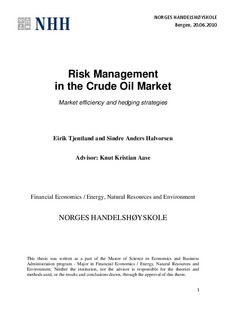Risk management in the crude oil market : market efficiency and hedging strategies
Master thesis
Permanent lenke
http://hdl.handle.net/11250/168529Utgivelsesdato
2010Metadata
Vis full innførselSamlinger
- Master Thesis [4372]
Sammendrag
This thesis aims to explore two main issues. First we study crude oil prices in view of weak-form efficiency. Thereupon we look into different hedging strategies that could be used to stabilize income in a market with high volatility. The data used are crude oil prices of West Texas Intermediate between 1987 and 2010. We conclude that the spot crude price and the 3 month future price for the same oil type are weak-form efficient. The two prices tend towards a long-run equilibrium and differences in prices are quickly adjusted. OPEC’s role in the market is discussed as a weakness to price efficiency. Based on efficient prices, we find that the minimum variance hedging method gives the lowest risk, but a naive hedge ratio is easiest to implement in a business strategy for a risk averse management. On the other hand, a risk neutral oil company would get a higher added return by merely buy and sell in the spot market. By introducing a multiple risks hedging model consisting of price risk and exchange rate risk, we suggest that a Norwegian company could reduce its total risk of the portfolio by increasing its exposure in the currency market.
